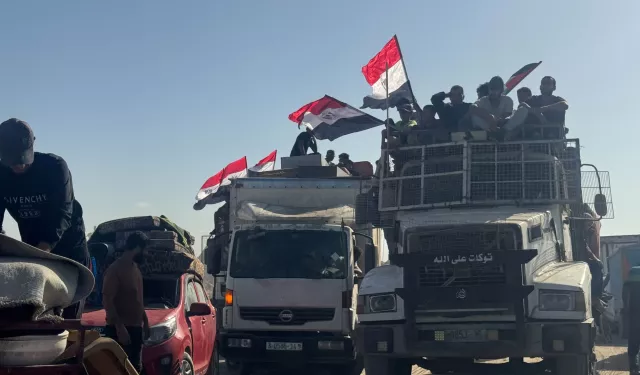The Egyptian Relief Committee for the People of Gaza dispatched a convoy of 100 trucks on Saturday to move displaced families from central and southern areas to the north of Gaza along the re-opened Al-Rasheed street.
“These families are among the most vulnerable, economically shattered and psychologically worn down by repeated displacement,” Mohamed Mansour, spokesperson for the committee, told Al Manassa. “Our priority now is relief: food, shelter, clean water.”
Mansour added that the mission was launched under direct orders from President Abdel Fattah El-Sisi and coordinated from three hubs in Khan Younis and Deir Al-Balah. The initial batch of 10 trucks, carrying food parcels, was dispatched on the first day of the ceasefire. It was followed by the 100-truck convoy that transported displaced families. Mansour confirmed that more aid convoys will follow in the coming days.
He added that the committee has rented land in northern Gaza and is working to build more than 11 new displacement camps, complete with tents, basic supplies, sanitation systems, and mobile health units.
In recent weeks, seven camps were established in central Gaza, now hosting over 2,000 families. Work has already begun on water infrastructure, and Egypt plans to dig wells in multiple neighborhoods across the north, according to Mansour.
Al Manassa interviewed multiple families during the transfer.
“I lost my job and home. We fled on foot and expected to return the same way. Egypt spared us that,” said 48-year-old Motie Abdelsalam, who boarded one of the trucks headed for Gaza City. “The truck got us there in two hours. It would’ve taken seven on foot.”
Um Karim, another resident, said her family postponed returning because they couldn’t afford transport. “We were waiting to collect enough money. Egypt’s trucks gave us a way home,” she said. “I lost my husband and son in this war. At least now we can start again.”
The initiative came as Israel and Hamas signaled early-phase acceptance of the US-brokered ceasefire plan. On Thursday, US President Donald Trump announced the agreement, which includes an Israeli military withdrawal and a prisoner exchange. On Friday, the Israeli army announced it had completed the withdrawal of its forces, warning Palestinians to avoid contact with soldiers remaining along Gaza’s borders.
The ceasefire deal includes the release of 250 Palestinians with long-term or life sentences, and 1,700 others arrested since Oct. 7, 2023—including 22 minors. Israel will continue to hold approximately 9,000 Palestinians in detention.
Central to the agreement was Hamas’ demand for the release of key Palestinian detainees in Israeli prisons serving long sentences, including Marwan Barghouti and Ahmed Saa’dat. The US later backtracked on providing guarantees for their release, as Israel refused to include Barghouti among those slated for discharge.
Back at the Egyptian Camp camp in central Gaza’s Al-Zawaida town, Ahmad Al-Shawwa, head of public relations, said they currently host 103 families who fled northern Gaza during Israel’s ground assault.
“We prepared the land, set up sanitation, and provided each family with a tent, food box, hygiene kit, mattresses, and blankets,” he said. “Egypt has also built mobile clinics and dug water wells for camp residents.”
Among the residents is 48-year-old Hanan Abu Jarad, who fled Gaza City with her family. “We stayed with relatives until their homes were gone, too. We had to escape under fire. The Egyptian camp gave us shelter. It’s not a home, but it’s far better than the sidewalk,” she said.
Abu Jarad added that Egypt provided them with food and hygiene kits at a time when prices in Gaza had skyrocketed. “We couldn’t even afford bread. Now we can breathe.”
Youssef Mamdouh, 14, said he finally feels safe. “I made friends here. We play between the tents. Back in Gaza, we were terrified all the time. I want to go back—but only when it’s safe.”
The Health Ministry in Gaza declared that 67,173 Palestinians have been killed since the Israeli genocide began on Oct. 7, 2023, including 20,179 children, 10,427 women, and 4,813 elderly people. Another 169,780 have been injured.
A recent UNRWA study published by The Lancet medical journal warned that over 54,600 children in Gaza now suffer from acute malnutrition and face increased risk of death without immediate treatment.
